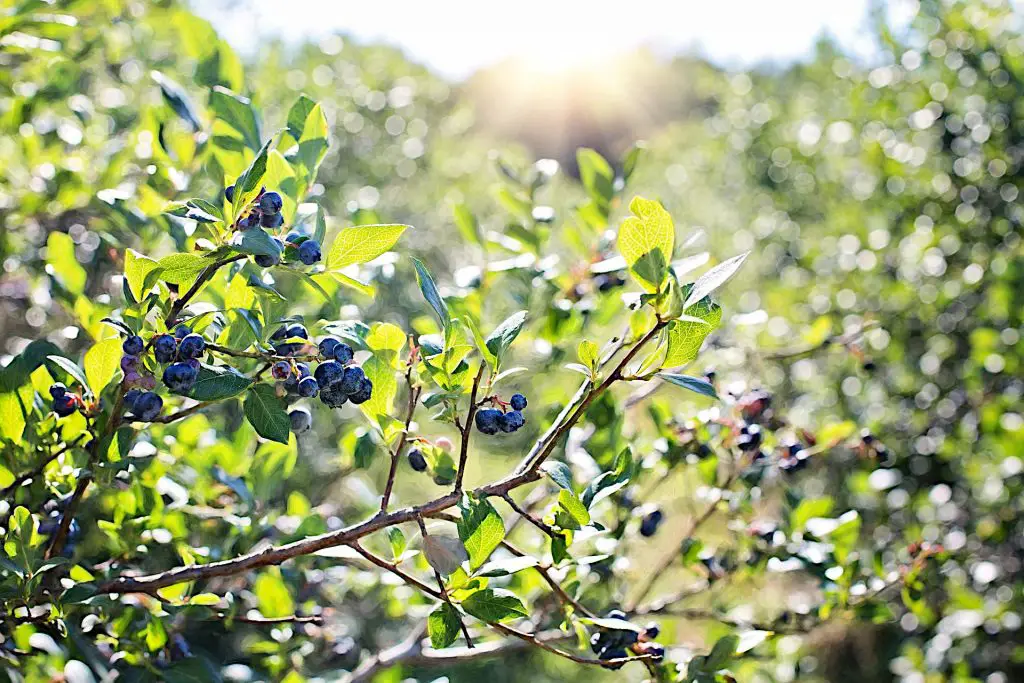Acidic Compost for Blueberries
Blueberries are an acid-loving plant. Although they grow in a wide range of soil types they prefer a soil that is pH of 4.5 to 5.5. Using acidic compost for blueberries can help in providing the right soil conditions for them to thrive.
Using acidic compost when planting blueberry bushes though, can end up being a temporary solution to bringing down the pH of the soil. However, when combined with other measures, acidic compost can be part of a long-term, self-sustaining, nutrient-rich soil in which blueberries will thrive.
Do blueberries grow better in acidic soil?
Yes, blueberries grow best in acidic soils and direct sunlight. However, it is important not to make the soil too acidic. Blueberries thrive in slightly acid soil conditions where pH is between 4.5 and 5.5. If the soil pH drops below this you will find that they will struggle.
If you need to bring down your soil’s pH level to make it more acidic, adding acidic compost is one solution. You should though, be careful to monitor the pH levels with soil testing kits, taking regular readings.
Does adding acidic compost for blueberries help them grow?
The key is to develop a solution that maintains this soil within this pH band. Adding acidic compost for the blueberries will help but on its own will only act as a short-term solution.
Acidic compost for blueberries though can also play a major role in developing a long-term, nutrient-rich, self-sustaining acidic soil eco-system that will allow blueberries, and other acid-loving plants, to prosper every year.
General soil conditions required by blueberries

Heavy clay soils tend not to be ideal for growing blueberries. However, if decompacted and with the addition of slightly acidic compost as a mulch, heavy clay soils may be made more favorable.
In addition to ensuring that you have the right level of acidity in your soil, you should, before planting, make sure that any perennial weeds have been removed from the planting location.
One way to eradicate weeds before planting and to help develop nutrient-rich, slightly acidic soil, is to consider adding cover crops. You will find it beneficial to the long-term growth of your blueberry bushes to establish cover crops, such as rye or buckwheat, and plow them into the soil together with soil sulfur for a couple of seasons before actually planting blueberries.
How to make acidic compost for blueberries
Generally, the compost you make will be slightly acidic by nature. You can test it using a soil testing kit to see what the current pH level of your finished compost is.
You can manage your compost pile to make it more acidic with the mix of organic materials that you add. If you need to make your compost more acidic you can add the following organic materials:
- Beech and Oak leaves
- Conifer ferns
- Pine needles,
- Onions,
- Vinegar,
- Citrus fruits,
- Bark and wood chips
You can find more details on making acidic compost here.
How do I make my soil acidic for blueberries?
The problem with many solutions is that they only provide a temporary fix as the acidity soon leaves the soil. Creating long-term, self-sustaining acidic compost for blueberries is the best way to ensure continued strong growth season on season. Although the best solution it does require some preparation.
If your soil is not naturally acidic then a lot of the measures can end up being short-term and need to be repeated to maintain the best growing conditions.
The key is to develop a self-sustaining soil ecosystem that generates acidic compost for blueberries. This may take a couple of seasons to develop so requires forward planning.
Establishing self-sustaining acidic compost for blueberries
There are four stages that are needed to establish a soil food web that generates the right soil and acidic compost for growing blueberries.[1]
Step one: Making and controlling acidity levels of your soil
By using organic soil sulfur you can make and control the acidic levels in the soil. It is best to use soil sulfur that is highly soluble in water as this will help rapidly bring the overall acidity of your soil to the correct levels for growing blueberries.
You will sometimes see suggestions for adding aluminum sulfate into your soil. Although this will reduce the pH level of your soil it also contains a considerable level of salt that could damage the overall quality of the soil.
Step two: Foundations of a self-sustaining soil environment
Adding the soil sulfur would only temporarily change the soil pH level. To fully maintain its pH levels and nutrients levels for growing blueberries organic material needs to be added. This can be done by adding acidic compost into the soil.
An alternative way of adding organic compost is by establishing cover crops such as rye and buckwheat which you plow back into the soil over a couple of seasons. The organic material will break down into an acidic compost over a period of time to feed the soil.
Step three: Enhancing the soil lifecycle
Adding acidic compost and organic materials is the process that adds life to the soil. and feeds the microbes in the soil, generating more beneficial bacteria to feed deep down into the earth.
Good protozoa, beneficial fungi, and good nematodes are the fundamental requirements of healthy soil, and the foundations for this are provided by adding the acidic compost.
Step four: Triggering the cycle
Now nature takes its course. With all these elements present a self-sustaining cycle will start. The bacteria, which are the most basic form of life in the soil, provide food for the fungi. These, in turn, are consumed by protozoa. Finally, the nematodes eat the fungi and protozoa, and in this, you have created a soil, food-web.
Because earthworms are attracted to and devour the beneficial nematodes, you end up having earthworms in your soil, and earthworms in your soil are a great indicator of good soil.
These methods are effectively adding life to your soil and produce a lasting solution rather than a season by season one with the soil life benefits in return.
Maintaining acidic compost for blueberries
Although this would need planning and delay the growth of your blueberries, by establishing a self-sustaining soil food-web that maintains nutrient-rich acidic compost in which the blueberries will continue to thrive season on season.
If you find that acidic levels do drop then adding acidic compost around the blueberries will reinvigorate the cycle.
Notes:
[1]Oregon State University: Growing Blueberries in Your Home Garden
